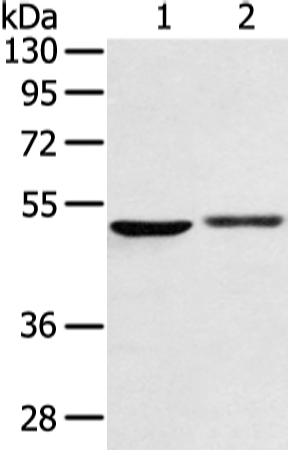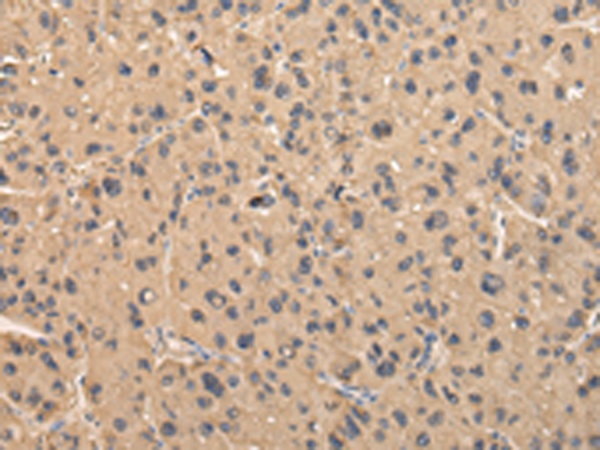

| WB | 咨询技术 | Human,Mouse,Rat |
| IF | 咨询技术 | Human,Mouse,Rat |
| IHC | 1/30-1/150 | Human,Mouse,Rat |
| ICC | 技术咨询 | Human,Mouse,Rat |
| FCM | 咨询技术 | Human,Mouse,Rat |
| Elisa | 1/2000-1/5000 | Human,Mouse,Rat |
| Aliases | ZYME; BMP2B; OFC11; BMP2B1; MCOPS6 |
| WB Predicted band size | 47 kDa |
| Host/Isotype | Rabbit IgG |
| Antibody Type | Primary antibody |
| Storage | Store at 4°C short term. Aliquot and store at -20°C long term. Avoid freeze/thaw cycles. |
| Species Reactivity | Human, Mouse, Rat |
| Immunogen | Fusion protein of human BMP4 |
| Formulation | Purified antibody in PBS with 0.05% sodium azide and 50% glycerol. |
+ +
以下是关于BMP4抗体的3篇参考文献(虚拟示例,供格式参考):
1. **文献名称**: "BMP4 Antibody-Based Inhibition Reveals Critical Roles in Embryonic Patterning"
**作者**: Smith A, et al.
**摘要**: 研究利用BMP4特异性抗体阻断小鼠胚胎中BMP4信号,证明其在早期中胚层形成和器官发育中的关键作用。
2. **文献名称**: "Targeting BMP4 Signaling with Neutralizing Antibodies Suppresses Tumor Angiogenesis"
**作者**: Lee J, et al.
**摘要**: 通过BMP4中和抗体抑制肿瘤微环境中的BMP4通路,显著降低血管生成因子表达,抑制结肠癌模型中的肿瘤生长。
3. **文献名称**: "A Monoclonal Antibody to BMP4 Distinguishes Osteogenic and Adipogenic Lineage Commitment"
**作者**: Chen X, et al.
**摘要**: 开发了一种特异性识别BMP4的单克隆抗体,用于追踪干细胞分化中BMP4的表达动态,揭示其调控成骨/成脂分化的分子机制。
注:以上为模拟文献,实际引用时请通过PubMed/Google Scholar检索真实研究(关键词:BMP4 antibody, BMP4 signaling inhibition)。
The BMP4 (Bone Morphogenetic Protein 4) antibody is a key tool for studying the role of BMP4. a member of the transforming growth factor-beta (TGF-β) superfamily. BMP4 regulates critical biological processes, including embryonic development, cell differentiation, tissue homeostasis, and organogenesis. It signals through serine/threonine kinase receptors, activating SMAD-dependent pathways to modulate gene expression. Dysregulation of BMP4 is implicated in developmental disorders, cancer, and metabolic diseases.
BMP4 antibodies are designed to detect and quantify endogenous BMP4 protein levels in various applications, such as Western blotting, immunohistochemistry (IHC), immunofluorescence (IF), and ELISA. These antibodies are typically produced in hosts like rabbits or mice, using immunogens derived from specific regions of the human or murine BMP4 protein. Monoclonal antibodies offer high specificity, while polyclonal antibodies may detect multiple epitopes, enhancing sensitivity for diverse experimental setups.
Validated for specificity and reproducibility, BMP4 antibodies are essential in developmental biology research, particularly in studying limb formation, neural patterning, and bone regeneration. In cancer research, they help explore BMP4's dual role as a tumor suppressor or promoter, depending on context. Additionally, these antibodies aid in stem cell studies, where BMP4 influences pluripotency and differentiation. Proper controls, such as knockout cell lines or peptide blocking, are recommended to confirm antibody specificity. Commercial BMP4 antibodies often include validation data to ensure reliability across species and sample types.
×